So…. You may remember I at one point, quite a while ago, wrote a fairly scathing post regarding certain aspects of this film. Anyway, what with one thing and another, I decided lately to take a properly immersive look (actually rewatching it a number of times so as not to jump to hasty conclusions) and then do a proper review.
So, y’all game to do this thing with me? ;)
For a little P&P background, I do want to say right off the bat that I grew up with the 80’s BBC version, then came to enjoy and thoroughly love the 40’s film and ’95 mini-series + I’ve read and listened to the book several times of course. Just so my history and credentials are out of the way and you know where I’m coming from, and just in case it matters to anyone. ;) (And also since I haven’t actually reviewed any of those yet, shocking!) In this post, though, I’m not going to do any comparisons between films, we’ll just be talking about the ’05, and here and there the book.
I stumbled across a point someone made a while ago critiquing the attitude of the director (i.e. as being careless and disrespectful etc.) and it was strong enough to make me look him up. And…. I ran across this excellent interview. Suffice to say, he appears to have had the highest respect for the story and reading the article deepened my appreciation for the storytelling in the film. Plus, he mentions some fascinating things about the French Revolution etc. in the context of P&P. The interview's not for everyone, but it's interesting.
(I’ll be popping in and out of narrative style, with some long rambles here and there, so bear with me. And enjoy. <3)
We start in a home that's clearly seen better times and is comfortably messy. I’m still thinking through the ramifications of and possible historical background for the farm setting, but strongly suspect I'm coming around to liking it.
I find the whole family less dysfunctional than in the original (i.e. so this is softening them and resonating more). They all come across as pretty tightly knit and there are even these little flashes of connection between Mr. and Mrs. Bennet -- like he likes hassling her, but it’s the good-natured teasing between a husband and wife who, while maybe not as deeply close as they could be, have still lived life together and have a rapport. Mrs. Bennet though is very much softened from the book.
This has my favorite Jane. I mean, how could Mr. Bingley help falling in love with her at first sight?
And I like this Mary. Again, softened, but also given more dimension. I really hope she has her own happy ending in the future.
(I love the inclusion of children popping here and there in the dance, and Mr. B actually fanning Mrs. B.) It’s interesting to think of viewing this as a bit of a country carryover from an earlier era -- with the roisterous, bumptious, welcoming energy of Shakespearean/Elizabethan London.
I was going to say this Mr. Darcy doesn’t seem so much proud as Misunderstood (which Lizzy actually says at the end, i.e. “She didn’t understand him”). But that, too, is fairly in keeping with book Darcy, i.e. book Darcy does have some flaws and faces up to them, but in the end, Lizzy says, “He has no improper pride.” In other words, there is a proper pride (of which I’ve got much to say, but this is already getting long and it’d fit better when I get round to a ’95 review so we’ll just save it for then, shall we?)
And… I take back everything I've said in the past about this Lizzy. I’ve thought and thought about it, and honestly I don't feel she goes beyond the Elizabeth of the book. In fact, appearance and description-wise -- thin and brown with fine dark eyes and a vivid countenance -- she’s honestly very much how she’s described.
A familiar quote to many I'm sure, but we have Mr. Darcy's thoughts at the assembly ball: "...no sooner had he made it clear to himself and his friends that she had hardly a good feature in her face, than he began to find it was rendered uncommonly intelligent by the beautiful expression of her dark eyes. ...Though he had detected with a critical eye more than one failure of perfect symmetry in her form, he was forced to acknowledge her figure to be light and pleasing; and in spite of his asserting that her manners were not those of the fashionable world, he was caught by their easy playfulness."
The Lizzy of the book loves to laugh and walk and was in the habit of running gaily off. Fairly often.
Now I do realize that there’s JA’s definition of behavior v. our definition nowadays, but, competitive racing aside, there’re only so many ways to run, you know.
To quote from another familiar section: "Jane, who was not so light, nor so much in the habit of running as Elizabeth, soon lagged behind, while her sister, panting for breath, came up with him, and eagerly cried out, 'Oh, Papa, what news? what news? have you heard from my uncle?'"
This Lizzy has a very fluid, speaking countenance, showing the little moments and flashes of shyness and hurt, but then easily bringing a quick sparkle and a laugh.
I like the tight sisterliness.
I don’t know what
parts of the sturdy English squire of the 19th century were left over
from remnants of the Elizabethan and then Cromwellian era, but I'm looking forward to piecing it together more. Definitely lots of food for thought there.
And I need to delve into this even more, but I’ve been mulling it over for about a month now and I really think (in fact, from what I've read, I know) they were trying to show some of the cultural contrast developing early in the 19th century: with Classicism held in high regard, especially in aristocratic society, and then the emerging passionate energy of Romanticism (which, of course, we hear about even more with Marianne in Sense & Sensibility). According to the internet, Romanticism is definitely a theme of the film, but the Classicism thread comes out very obviously here and of course it'll come out at Pemberley too.
Miss Bingley (liking to consider herself thoroughly high society, though nothing close to Lady Catherine, due to the family's history in trade and all that) also specifically refers to something being positively medieval in one scene, which (incidentally) is something the Romanticists were shooting for.
But here I'm eager to think through what understanding of medievalism is being referenced. (Not that I think Miss Bingley was thinking about all this, but just for the sake of argument and because it's so fascinating.) Bear with me here: while they may have had some valid points, it's important to wrangle through whether the Romantics, with their idealized version of the medieval world, were actually right in their representation of medieval
thought or what they were in turn misinterpreting (or just didn't care about). On the
presuppositional level, with their emphasis on the innate goodness of man, they stood on an opposite pole from those who built
the foundations of medieval Europe, so yeah, obviously they would wind up with a different end
result. (But that's a discussion for another day.)
Book Lizzy isn’t a romanticist -- and she’s not really in here either -- but that undercurrent of cultural conflict is definitely swirling through everything.
Back to the scene at hand. Just look at the deep saturated colors.
On the costuming: I really like these for their own sake. They all look so comfortable and most are really quite lovely. If there is any period mixing it quite suitably highlights the different characters and personalities. Besides which, I’m finding that certain things like precision for the exact fashion decade don't bug me (personally) at all as they once did. Not saying it’s unimportant or that there’s not a vast field of interesting study there -- it just doesn’t bother me. It also shows continuity and the overlap of generations and styles. (Important note though: I do really like Lizzy's dress in this scene.)
Mr Bingley sometimes does seem a biiiiit empty brained, but generally he just comes across as being awkward and sweet. (Though I do have to say, what in the world is he doing hanging round the sick room? Is he personally taking care of Jane?? Hoping I’m just missing something there. ;P) And I totally didn't realize that Bingo shows up in here!! Seriously, when he came around the corner I just started grinning (well, giggling would be more accurate). XD
The first time I saw this I remember thinking Mr. Collins was simply rather awkward and flat -- now I’m noticing how truly funny he is. He’s appropriately stifling and most definitely pompous, but also not a villain. Given her position and the times, it’s reasonable for Charlotte to choose to marry him.
Wickham is very well done.
Things develop quickly after he comes on the scene, but on the flipside, I like how this highlights his indelicacy in confiding so much to a stranger.
The Netherfield ball is all white and pretty, with nice character development all round. Mannerism-wise, I’ve noticed how several times Darcy will wait, just quietly, till whoever it is stops/he has their entire attention. It’s not like he’s impatient; just like, “Ok, well now that we’re all collected…” Not sure if this trailing thought will make sense, but it's so funny.
I love the moment with Mr. Bennet and Mary. (Awww… *sniffs*)
And just counting here, but it looks like after the ball, Mr. Collins escorted Lizzy home in his own equipage.
With Mr. Collins’s proposal I noticed how it’s bringing out his yes, awkwardness, but well-meaning-ness as he’s trying to be gallant and fulfill his duty, as he sees it. He’s absurd, but you can tell it’s almost a relief for him when he ultimately accepts her refusal.
Only, poor Mary.
Goooorgeous lighting. <3
The Netherfield inhabitants depart… *cue the sniffles*
I’m still working on this theory, but in the film I feel like they amp up the tension between Mr. and Mrs. Bennet as we go along, i.e. they’ve been able to muddle through all right thus far, but now their daughters are of marriageable age, which is a big deal, and as the story itself progresses it’s creating more strain between Mr. and Mrs. Bennet.
Lizzy’s definitely growing on me and doesn’t even seem as boisterous to me as she did in the past. This Lizzy changes so much over the course of the story, but all the way through she has a sweet lightheartedness -- and she’s gentle and sensitive and fiercely loyal.
You can pause almost any frame and the composition is just stunning.
Dame Judi Dench as Lady Catherine brings in a strong, self-assured, weighty Georgian presence. (And here I'll add the casting for all the secondary characters is fairly excellent.)
Something's simmering...
This scene is charming, leading eventually into...
The First Proposal.
The whole tempestuous interchange set against this strongly Greco-Roman backdrop -- purity of form and restraint with rain lashing and emotions roiling to a cyclone.
And we have the letter scene. It's really surprising to me (given the uproar over the ending sometimes) that apparently no one takes issue with this bit, but hey. It sets up the ending and I do like how everything flows smoothly through here, so I guess on the whole it doesn't much bother me.
Filming-wise, all through we have alternating blue and gold -- often together and/or infusing entire scenes (as a for instance, the proposal scenes: the first all blue in the driving rain and the second turning to gold in the sunrise). Such utter loveliness. *happy sigh* <3
<3
And we get to Pemberley.
Ok, so a big emphasis in classicism was appealing to the intellect and
it's intriguing how they show Lizzy so struck and pondering so deeply --
meeting these high forms of art. We know she's witty and has a very
bright mind, so this is feeding that on a deep level. Here’s a place
where she can grow -- a place where she can hone that wit.
And we have the blind -- or rather, veiled -- marble statue. Fact wise, it’s a veiled Vestal Virgin (brought from Milan by the 6th Duke of Devonshire). Story wise, is this justice? Or Lizzy herself? Later, she brushes her hand across the smaller statue of the two-faced Roman god Janus, looking behind to the past and forward to the future. (Again, this might already be super obvious to everyone else, but I thought it was neat.) And we have the lion statue: lions of course, in various places symbolizing power and prestige, honor and respect.
This moment, looking through the door, ties in with all the other such scenes in the film, but here, too, you get the sense that she's separate and looking in on another world.
And then she runs -- like she has before -- but this time she gets circled by the balustrade.
It’s a dead end and she has to face him.
And this scene right here is where I start loving it.
His gentleness in winning her is just lovely. And his courtesy to Mr. and Mrs. Gardiner.
I feel like the ending with the Lydia wrap-up happens pretty quickly.
But you know, time constraints (and who really wants to park there for too long where it's all misery anyway?).
And now... we’ve gotten to the ending.
I love the coaching scene. xD <3
Bingley’s proposal is just… such all around happiness. It’s so sweet!
(Had to include these solely because of all the beauty + all the emotion.)
And I think my hunch on the Mr. and Mrs Bennet development is right... We see here that they actually do care about each other and have the easy comfortableness that comes from knowing your spouse very well. It's not necessarily true to the book, but I like it. And then we also have this sweet sister scene.
Lady Catherine shows up and then we come full circle to the ending -- mirroring the beginning, but not all heavy-handed. It’s graceful and flowing and beautiful.
I love how they understand each other. In fact, it’s all pretty fairly magnificent.
So funny.
And this Lizzy and Mr. Bennet scene is the only one that’s ever made me cry. *sniffs*
As for the alternate ending… I’m not a fan of guys’ bare ankles and the entire dialogue is frightfully awkward, and I like ending with Mr. Bennet chuckling, and oh well. Let’s move on to something else.
Content-wise there's the statue gallery and some magnificent Renaissance paintings, so whatever you feel comfortable with in that regard. And there is one brief scene with the sisters in their corsets while getting ready for the Netherfield ball, but on a scale of such scenes it's not bad.
I said I won’t compare it to other versions and I don’t intend to. But I would like to draw a line between it and the similarly two hour long classic from 1940. They change and tweak some things in there too and it all works. In conclusion, if I can love and enjoy multiple versions of Emma, each highlighting different facets and themes of the story, I can do the same here.
The more times I see it, the more I notice the depth and complexities and I’m liking… nay, starting to love it very well indeed. <333
So! There ye are. I don't know if this is as hotly contested as it once was, but I hope we can enjoy this together or at least agree to disagree most amicably. ;) Have at the comments box with your thoughts!
Reviewed for 18 Cinema Lane's Thankfulness Blogathon.






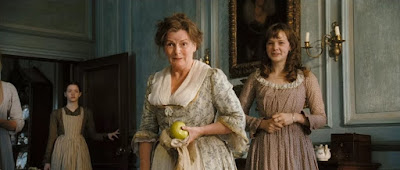





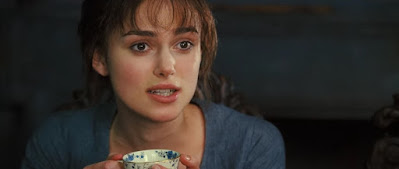

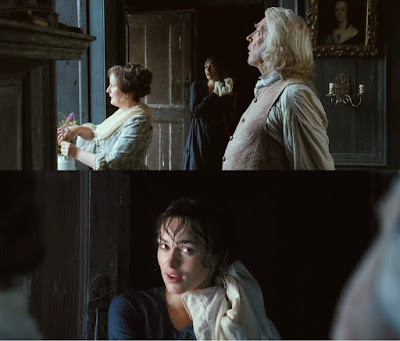


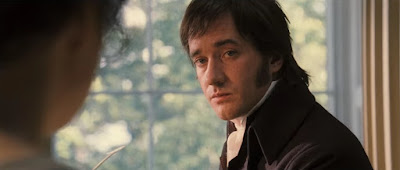































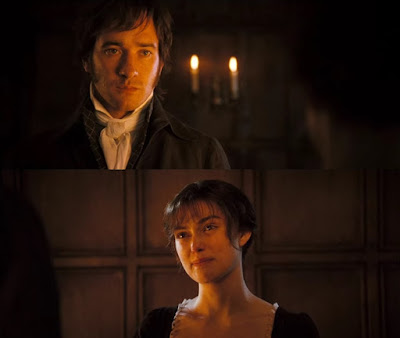





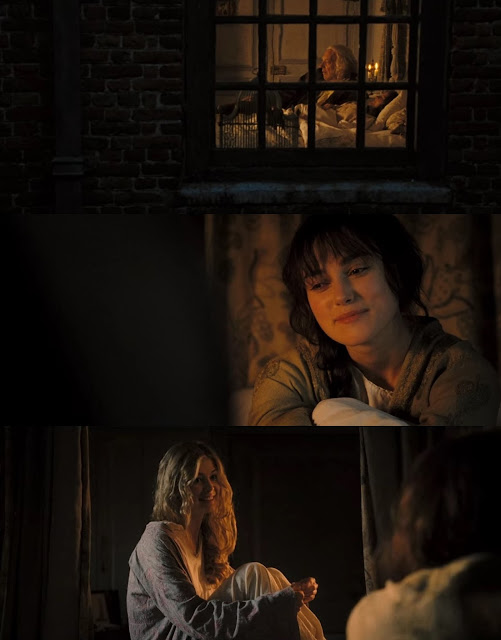








I stopped everything I was doing when I saw this in my inbox - I loved it! The 1995 version is great, but I am staunchly in the 2005 camp. I have seen it more times than I can count for all the reasons you described above. I loved your comments about the cinematography, casting, color scheme etc.
ReplyDeleteAhhh, I love this review! And I'm so happy you enjoy this film now. I feel like the all the Drama with a capital 'D' surrounding this adaptation has sooooort of died down . . . I think part of that is possibly due to the trend of more and more fashion historians commenting on how the "inaccurate" costuming is actually not as inaccurate as people suppose, given Wright's decision to set the film in the time period of the book's first draft.
ReplyDeleteRegardless, I love this version, and I love the '95 miniseries, too. They have completely different aesthetics, stylistic intents, and thematic foci, so it makes sense that one or the other won't appeal to everyone. As you said, we can appreciate multiple iterations of the same story. If a story is sufficiently rich, of course it will lend itself to a multitude of interpretations -- which is part of what makes it a good story! <3
Pride & Prejudice isn't one of my favorite stories (at least, not in terms of plot), but one thing I love about this version is how incredibly relaxing it is. It captures the essence of the feeling you get when you've woken up before sunrise and get to watch the dawn slowly seeping into the world, saturating it with natural, vibrant, secretive colors. The whole movie feels that way, and I love it. <3
Such a fun post, m'dear! :D <3
Very thorough review! You did an excellent job explaining how your views on this film have changed. Since you're a fan of 'Emma' and 'Pride & Prejudice', I think you would enjoy the 'Random Acts' episode, 'Ball Dressed Up'. In this episode, a woman named Ciera is surprised with a Jane Austen inspired ball by the 'Random Acts' team. If you want to check the episode out, it can be found on BYU-TV's website.
ReplyDeleteThanks for joining my blogathon! I did add your review to the participant list.
I like both versions but P&P 95 will always be my favorite. My one problem with this version is that the actress playing Mary, Taulah Riley, was hands down the most beautiful of all the girls.
ReplyDeleteThis was just delightful to read, Heidi! P&P is my very favorite Jane Austen story, and the '95 was my introduction to it so it is obviously my favorite. This was the second version I'd seen, and I couldn't believe how different it was! Since then I've seen multiple versions, so I don't think I would mind it so much if I saw it again. I love all the points that you made about the cinematography (especially the details with the statues! I didn't notice that!). That was one of my favorite parts, in addition to the score. Also, I hadn't noticed the change in Mr. and Mrs. Bennet's relationship. I have a few tiny complaints that keep me from loving it, but you have definitely made me appreciate it more. Wow, now I actually want to rewatch it? What is happening?
ReplyDelete*happy sigh* You're making me want to re-watch every Jane Austen movie and re-read aaall the books again, haha. <3 I loved reading this! I used to really like this movie - it was actually my introduction to Jane Austen! - but last time I watched I didn't enjoy it as much. I think perhaps I was comparing too much to the '95 one and how fast-paced it was, which is silly since the other is a mini-series! There is so much FINE detail in this one, that is so easily missed. I loved how well you pointed it all out. Now I'm really keen to watch it again and appreciate it for what it is. ;)
ReplyDeleteAlllllllll the beautiful pictures!
ReplyDelete"Comfortably messy" is a good way to describe the Bennet family as a whole, isn't it?
I really love the visual contrasts in this film, which you touched on. The Classical elegance of Netherfield and Pemberley, which lends itself to coldness and (in the case of Miss Bingley), aloof disdain; the more old-fasioned, shabby-gentee, lived-in comfort of Longbourn; the over-ornate and stuffy Baroque feel of Rosings. They really worked the visuals to bring out the differences in class and personality.
The whole film feels like England on the brink of a cultural revolution of sorts. They're moving from fussy Baroque to sleek neo-Classicist. From extremely formal behavior like Mr. Collins and Lady Catherine to the still-formal-yet-kind behavior of Mr. Bingley to the relaxed and friendly behavior of Lizzy Bennet, and then also descending into things getting relaxed too far and people acting like Lydia and Mr. Wickham. Everything is changing, and no one is quite sure what that means for them, which I think is a big part of why the filmmakers set it just before the Regency was really in swing -- to show that change in an outward way as well as in the characters' actions and thinking. Change is hard, and changing yourself is harder.
I think Bingley is hanging around the sickroom because he is besotted with Jane and wants to see her as much as he can, to serve her and help her any way possible. He does come off as a bit of a kid sometimes, and kids will just hang around someone they admire or like, often with no reason except wanting to be by them.
This Mr. Collins is, like... almost nice. You can see the possibility of Charlotte gradually guiding him into becoming someone you don't mind being around. He has good intentions, he's not creepy or unctuous, he's just... well-meaning and bumbling.
I think there definitely is a sense of needing-to-get-the-daughters-well-married creating a strain between Mr. & Mrs. Bennet. She's soooooo focused on it, and he's more willing to just let the girls find husbands, and so they're on polar opposite sides of what good parents ought to be.
As you say, every time I watch this, I find more layers to it. Rather like rereading the book!